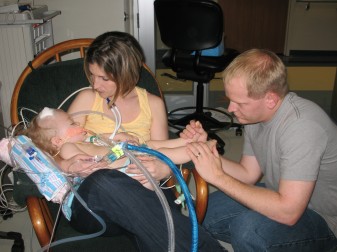
"Your daughter is not responsive and I called the ambulance. You need to come right away."
Those are the sentences no parent wants to hear, but they're what my cousin Tiffany and her husband were told by their child's caregiver. On the morning of April 3, 2008, Tiffany and Brandon watched their 14-month-old daughter, Alexis, run for her very first time. Just hours later, they looked on as that same little girl was lying in the hospital in an induced coma, on a ventilator, in a neck brace, and with a drain managing her brain pressure. Alexis had bilateral subdural hematomas and retinal hemorrhaging, both signs of having been shaken. Medical records state that she had "abusive head trauma" and "non-accidental trauma," both conditions that fall under the definition of Shaken Baby Syndrome.
Sometime between 9 a.m., when they dropped Alexis off at in-home day care, and the phone call 45 minutes later, something had gone horribly wrong. The day care shut down a matter of hours after the incident and the caregiver was charged with willingly causing serious bodily injury to a child, though she was ultimately found not guilty. Brandon and Tiffany heard indirectly that at least two jury members were torn on whether or not the day care provider "knew" that what she did would cause Alexis serious bodily injury.
Alexis is now 6 years old and in therapy four hours a day, three days a week. Tiffany estimates her daughter has had more than 2,500 hours of physical, occupational, and speech therapy at a medical rehabilitation hospital. She also has done hippotherapy (OT on a horse) for four years and receives occupational, physical, and speech therapy at school. As a result of Alexis' hard work, she can see, walk with leg braces and a walker, use her left arm and hand, and speak in full sentences. She even ran a 1-mile race in May (click here to see video footage)! Doctors thought most of these miracles would never be possible. But despite the hours of therapy, she still doesn't have use of her right arm or hand, her motor skills are delayed, she has a hard time with cognitive tasks, and she needs an adult to interpret her speech.

Alexis today
I recently talked to Tiffany about her experience raising a child with Shaken Baby Syndrome, what she sees for the future, and her advice for parents.
What is the ultimate goal for Alexis?
Our goal with Alexis is independence. My ultimate goal for her is that she'll finish school, and I know she will. And that she'll have a job, and I know she'll do that. And that she's going to be able to live a happy and independent life and that we can manage her body and what the brain injury has done to her body. So that's kind of the ultimate goal: for her to be happy. And she is.
You and Brandon packed up your lives and jobs at Texas A&M and moved home to Nebraska so you could have access to the only hospital in the country that would take Alexis as a patient. Do you ever feel that you're sacrificing any of your own happiness in pursuit of that goal?
When you become a parent, you're always going to have to sacrifice things for your children. When you are a parent with a child who has a disability, I don't necessarily know if they become sacrifices. It just takes a lot more to come to terms with. It's maybe not the life that you pictured, especially when you have a child who was born healthy and then ends up being injured. She's 6 years old and she can't brush her teeth by herself and she can't dress herself. If she takes a bath or a shower, you have to be right there to make sure she's not going to fall over. There are a lot of things that she was more independent with when she was 14 months old than she is now. But, for all of those things, the one thing that parents of children with disabilities get is a million times more joy out of small accomplishments. When she took her first steps when she was 12 months old, I thought it was awesome. When she took her first steps again when she was 4 years old, it was one of the best days of my life. For all the sacrifices, there are a thousand things that are good.
How do you stay strong and keep a positive outlook?
It is trying. And it's trying a lot of days, but the thing that keeps you going is there's always an improvement. And it always seems like when you're kind of at your wit's end, she gets better.
Have you been able to take steps toward forgiving the day care provider?
Forgiveness came really fast for me because I knew that if I didn't forgive her, Alexis was never going to get better. About six weeks after Alexis had been hurt, I noticed every single time that I held her she just cried, and cried, and cried. I got to thinking that, since she couldn't see, the only thing that she knew was how it felt when I held her. I was carrying so much anger and stress. I knew in order for Alexis to get better, I was going to have to hurry up and heal myself. It was effective. As soon as I had a positive attitude and really started to calm down, Alexis started to do better.
What is your message to parents?
People expect me to be anti-day care and I'm not. I think there are wonderful day cares out there and there are wonderful day care providers. What I will say to parents is the thing that I did not do, is I didn't trust my gut instinct. And I wish I would have. The day care came really well recommended. We knew several people who took their kids there over lots of years, including Texas A&M coaches' kids, the high school guidance counselor's kids, and kids of the principal in town. As a first-time mom, I was looking at the owner, this woman who had raised three kids of her own and taken care of all of these other children, and I thought I didn't know anything. I didn't trust myself as a mom, even though I was starting to notice that things weren't necessarily right. Alexis had diaper rash more, and it went away when she didn't go to day care for a week over spring break. The provider said the rash was because Alexis was teething, but now I know her diapers just weren't being changed enough. I think no matter if you're a first-time mom or you're a mom of seven kids, you know when there's something wrong with your child. That's always my number one message: to trust your gut.
Had I been open to talking to other parents and getting to know the families that Alexis was in the day care with, it could have possibly been prevented that way too. If you're a shy person, step out of your comfort zone to really know the person who is taking care of your child, to know the families that your child is going to day care with. That can make a huge difference.
The other thing is, especially with home day care providers, they have a lot of pressure on them. They're taking care of a lot of kids. We expect them to take care of our child the way that we take care of our child. We expect them to be on their A-game every single day, and that's not real for anybody. Sit down and have a really honest conversation with that person about what your expectations are and what their expectations are. If there is a day when they're just done and they can't handle it, tell them you're OK with that and you want them to speak up. That type of honesty can prevent things like what happened to Alexis.
As parents, as teachers, as caregivers, as doctors, as nurses, as family members—as just anybody in society—we have to be advocates for children. And when you see or you know that a child is being abused or hurt, you can't look the other way or assume that it's just a one-time thing. What happens is normally it spirals out of control and you end up with a bigger mess on your hands than you can even imagine. If I had any message for any person out there, it's to be a good advocate for all kids in your life. If you know that somebody is doing something to them, or even if you suspect it, there are resources everywhere where you can go and get help to solve that problem. Those little kids cannot do it themselves.
I always tell myself, "She's here. She's here and she talks, and she walks, and she's still improving." And there are a lot of children who, from either illness or injury, don't get to talk and walk. And their moms don't get to see them smile. So we are very, very lucky. Alexis has some serious disabilities. In the grand scheme of things, first and foremost, she's alive.
Here are some of the resources Tiffany is talking about:
The Childhelp National Child Abuse Hotline is staffed 24 hours a day, 7 days a week. All calls are anonymous. That number is 1.800.4.A.CHILD (18004224453).
Many States have a toll-free number to call and report suspected child abuse or neglect. To find your state's number, go to Child Welfare Information Gateway's list.
And if you ever have a moment when you're afraid you've run out of patience with a child, the best thing you can do is put her in her crib or other safe place, and walk away for a few minutes until you can calm down. Consider calling a friend or family member for help in the moment, or, between the hours of 9 a.m. and 5 p.m. CST, call The Fussy Baby Network at 1.888.431.BABY to reach a specialist who will listen to your frustrations and provide support.
Last November, Tiffany gave a powerful TEDx talk including photos and footage chronicling her family's experience. You can watch it here (and see the very special guest at the end!). She also has a blog that she started two days after the incident. Brandon and Tiffany, both video producers/editors, produced a documentary about brain injury and recovery called Pathways. Pathways inspired comedian Larry the Cable Guy to donate $1.2 million to build a new rehabilitation hospital in Lincoln, Nebraska, named after Alexis. I am so incredibly proud to be related to such a brave and inspirational family, and I know Tiffany, Brandon, and Alexis will continue to touch the lives of many on their journey to recovery.
